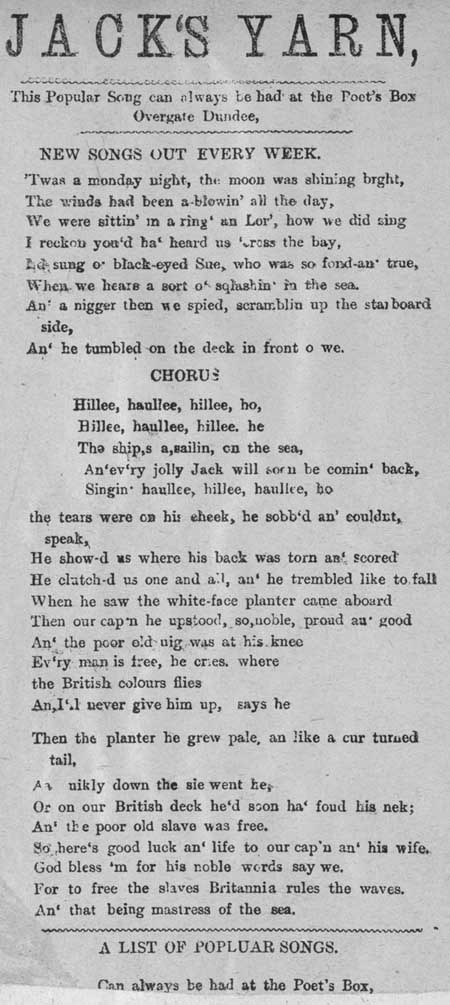
 |
| home | background | illustrations | distribution | highlights | search & browse | resources | contact us |
Broadside ballad entitled 'Jack's Yarn' |
CommentaryThis ballad begins: ''Twas a Monday night, the moon was shining bright, / The winds had been a-blowin' all the day, / We were sittin' in a ring' an Lor', how we did sing, / I reckon you'd ha' herd us 'cross the bay . . . ' Below the title, it is recorded that 'This Popular Song can always be had at the Poet's Box Overgate Dundee'. Set on a British ship, this ballad appears to be a song that criticises the existence of enslavement in the United States. The sailors are sitting in a circle making conversation when a Black man suddenly climbs up the ship's starboard side. After the man has shown the sailors the marks on his back where he was whipped, his enslaver, the planter, arrives on deck. Noting the hostile atmosphere, however, the planter abandons the ship, leaving the formerly enslaved man free. Britain abolished slavery in 1807, and throughout its empire in 1833, so this ballad may have been a propaganda piece written to show the British Empire in as favourable a light as possible. Its patronising language and use of racial slurs are typical of even texts which are sympathetic to enslaved people from this time. The Dundee Poets' Box was in operation from about 1880 to 1945, though it is possible that some material was printed as early as the 1850s. Most of the time it had premises at various addresses in Overgate. In 1885 the proprietor J.G. Scott (at 182 Overgate) had published a catalogue of 2,000 titles consisting of included humorous recitations, dialogues, temperance songs, medleys, parodies, love songs, Jacobite songs. Another proprietor in the 1880s was William Shepherd, but little is known about him. Poets' Box was particularly busy on market days and feeing days when country folk were in town in large numbers. Macartney specialised in local songs and bothy ballads. Many Irish songs were published by the Poets' Box - many Irishmen worked seasonally harvesting potatoes and also in the jute mills. In 1906 John Lowden Macartney took over as proprietor of the Poet's Box, initially working from 181 Overgate and later from no.203 and 207. It is not clear what the connection between the different Poet's Boxes were. They almost certainly sold each other's sheets. It is known that John Sanderson in Edinburgh often wrote to the Leitches in Glasgow for songs and that later his brother Charles obtained copies of songs from the Dundee Poet's Box. There was also a Poet's Box in Belfast from 1846 to 1856 at the address of the printer James Moore, and one at Paisley in the early 1850s, owned by William Anderson. Early ballads were dramatic or humorous narrative songs derived from folk culture that predated printing. Originally perpetuated by word of mouth, many ballads survive because they were recorded on broadsides. Musical notation was rarely printed, as tunes were usually established favourites. The term 'ballad' eventually applied more broadly to any kind of topical or popular verse.
|
Probable period of publication:
1860-1880 shelfmark: L.C.Fol.70(131a)

|